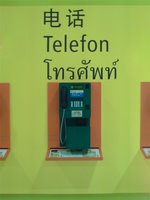This clip here was taken from the show "Justice Bao Slays The Princess Consort". It tells the story of Pang Xiong, a poor scholar who was saved by a rich man, Chen Qichang, in a flood and was subsequently adopted as his godson. Pang seemed like a refined young man, but he was actually a wolf in sheep's clothing. He seduced Chen's daughter, Xiuying, into having an affair with him, and stole a priceless night-glowing pearl from Chen's son Shirong while he was asleep during their trip to sit for the imperial examinations. Pang topped the imperial examinations, and by chance saved the Princess from a curse with the night-glowing pearl, which was actually a celestial treasure with magical powers. Subsequently, he became the Princess Consort, and Xiuying, who was already pregnant with his child, was left forgotten. Xiuying escaped from home to search for Pang, but was thrown out by him. Afraid that his relationship with Xiuying would hinder his marriage and career, he decided to had Xiuying silenced. Fortunately, Pang failed in his attempt to kill Xiuying, and with the intervention from Justice Bao, the heartless man finally met his desserts and was executed.
Personally, I am not quite pleased with the storyline, for it was far too long-winded. The synopsis I had given earlier was just the essence of the whole show. In the original show, there were other sub-plots like a jade fox spirit trying to create havoc by flooding the Eastern City, Taishang Laojun gave Chen Qichang the magical night-glowing pearl as a protective charm, the Jade fox spirit put a curse on the Princess to make her go crazy, and so on. To be honest, I don't think all these sub-plots do not really contribute much to the main storyline, and can actually be cut down to make the story more streamlined. Another area which I'm not very pleased with the troupe is the standard of the musical ensemble. Though their music is not too bad, the musicians' poor playing skills pulled down the quality of the musical ensemble's standard. As for the cast, I feel that only the female lead was better, while te rest of the actors were just average. Their costumes, though traditional, sometimes can be a disaster too, when the actors fail to wear according to the role they are portraying. For example, the actors assuming the roles of celestial soldiers were wearing normal wusheng costumes, hence failing to differntitate themselves from mortal soldier roles. These roles might have been very minor roles in the show, but I believe this point should still be observed. The costume wore by the jade fox spirit was weird also, looking more like a cross between a foreign princess and Dou'E from "Snow in June".
Despite my many negative feedback about this troupe, I am still hoping to see more of this troupe. Perhaps I'm positively biased against them since I'm of Xiamen ancestry, and I'm giving leeways because they are still a very new troupe. However, if they fail to work on these weakness and improve themselves, I'd have to classify them together with the other lousy troupes that had utterly disappointed me.





